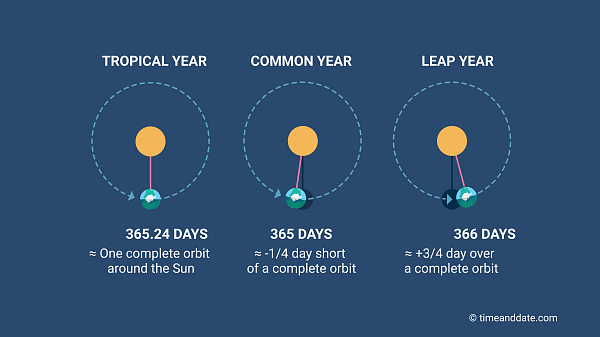
What is the same for the following years: 2024, 2028, 2032, 2036, 2040, and 2044? These are leap years. February has an extra day and lasts 29 days—the year of the US presidential election, as well as the year of the planned Summer Olympics.
However, why? The reasons behind this are somewhat complex. For instance, leap years always happen once every four years, despite what the majority of people think.
Why is this year’s leap year?
Typically, a calendar year consists of 365 days. The duration of one Earth’s orbit around the Sun is approximately determined by these so-called “common years.” However, 365 is a rounded number in reality. The Earth orbits the Sun Sun365.242190 days, 365 days, 5 hours, 48 minutes, and 56 seconds. There must be a way to account for the extra 5 hours, 48 minutes, and 56 seconds that this “sidereal” year has over the calendar year. The seasons would start to shift if we didn’t account for this additional time. Our summers, which we expect to start in June in the northern hemisphere, would begin to occur in December over approximately 700 years. This would be very annoying, if not harmful.
Our calendar years remain in line with the sidereal year by adding one additional day every four years, but that’s also a little off.
Why doesn’t this year happen every four years?
A little algebra will demonstrate that the gap between the sidereal and calendar years is not quite 24 hours over four years. It is actually 23.262222 hours. They were, once more, rounding strikes! We extended the calendar by around forty-four minutes by introducing a day every four years. The seasons on our calendar would also eventually shift as a result of these additional forty-four minutes. It is a year every four years because of this. According to the criterion, the leap year is excluded if the year is divisible by 100 but not by 400. For instance, years did not occur in the years 1700, 1800, and 1900, but they did in 2000. The year 2100 will be the next leap year omission.
Why is it called “leap year”?
A typical year has fifty-two weeks and one day. This implies that if your birthday falls on a Monday one year, it should fall on a Tuesday the following year. That being said, if a leap year is added, your birthday now “skips” one day. During a leap year, your birthday “skips” Tuesday and falls on a Wednesday instead of Tuesday as it would following a regular year.
Furthermore, celebrating one birthday every four years does not imply that you were born on February 29. You February 29te your birthday on March 1, and keeMarch one older, just like everyone else in years without leap days.
Because of the leap year, our seasons will always come on schedule, and our calendar year will coincide with Earth’s sidereal year.
Why is this day in February?
February is the month on which Leap Day falls because of Roman history.
“February was generally disliked by the Romans,” Ben Gold, an astronomy and physics professor at Hamline University in Saint Paul, stated to CBS Minnesota in 2016, two leap years ago. The Roman calendar of the first century BC had ten months, and the winter season was viewed as a single, uninterrupted time by the Romans. Ultimately, January and February were instituted by the Romans. The final month, February, had the fewest days.
According to Gold, Julius Caesar added leap days by order and changed the calendar to match the Sun. Sunill, this doesn’t provide a satisfactory explanation for the time disparity. Solving that would take hundreds of years.
Pope Gregory lived in 1582, therefore although 2000 was a leap year, 2100 and 2200 won’t be.
British legislation established February 29 as February 29, the eighteenth century.
What Leap Year Is 2024?
Yes, 2024 is a leap year. The date of the 2024 leap day is February 29, 2024, February 29, or 2028, February 29.
When will this day come next time?
Leap years occur every four years unless they coincide with a centennial year that cannot be split by four. The year 2028 will mark the next leap year. This year, February 29 is February 29. Then, on Sunday, February 29, 2032, will be a leap year.
Who Invented Leap Years?
Julius Caesar, a Roman general, instituted leap years more than 2,000 years ago when the Western calendar was originally established. The Julian calendar, which bore his name, had just one rule: a year that could be divided into four was a leap year.
The Julian calendar deviates from the tropical year by one day every 128 years, and as a result, this formula produces an excessive number of leap years. This was not fixed until more than 1,500 years later, with the adoption of the Gregorian calendar, which involved skipping a few days to correspond our calendar with the seasons better.
